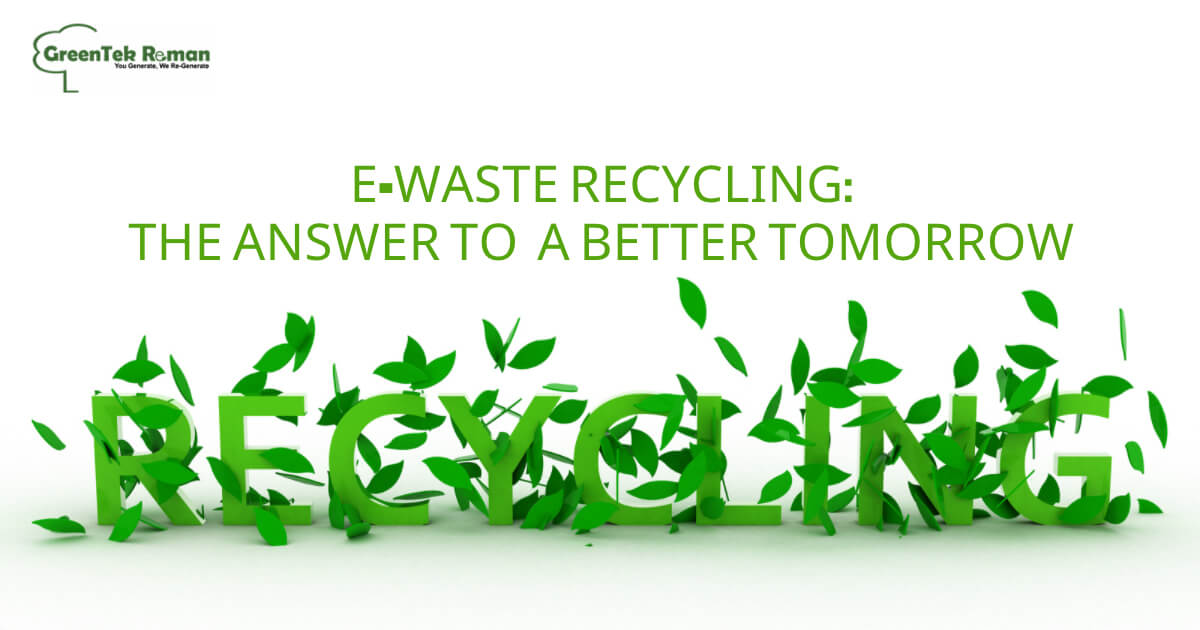Is Recycling E-waste An Answer To The Better Tomorrow
In today’s blog, we will be discussing recycling e-waste.
Do you have any idea what happens to electronic devices when they become obsolete? They turn into e-waste, electronic waste.
The rising issue of e-waste has governments around the world working on better ways to manage it. So far, one of the most sustainable ways to manage e-waste has been recycling e-waste. But before we start discussing recycling e-waste, let us first try to understand what exactly e-waste is.
What Is E-Waste
Electronic waste (e-waste) refers to any electrical or electronic device that is no longer useful, functional or has become obsolete.
Electronic waste is one of the fastest-growing segments of our nation’s waste stream. It encompasses all broken, unusable, or outdated/obsolete electronic devices, components, and materials. E-waste also includes items that can be recycled through an e-waste recycling program. It encompasses electronics that are going to be reused, resold, salvaged, or recycled.
Electronic scrap components, such as CPUs, contain potentially harmful materials such as lead, cadmium, beryllium, or brominated flame retardants. Recycling e-waste and the disposal of e-waste may involve significant risks to the health of workers and communities in developed countries. Great care must be taken to avoid unsafe exposure in recycling e-waste operations and leaking of materials such as heavy metals from landfills and incinerator ashes.
India is highly deficient in precious mineral resources, and untreated e-waste goes to landfills. By recycling e-waste, we can reduce our dependency on mining and the import of several precious metals. Thus, there is a need for a well-designed, regulated e-waste recovery regime.
Where Does The E-Waste Go?
More often than not in India e-waste is dumped in open dumpsites which gives rise to issues such as groundwater contamination, poor health, and more. Some of the e-waste is shipped to other countries according to agreements. But in most cases, especially in Ghana, a lot of the e-waste is illegally dumped. The e-waste is often disguised as used electronics (for second-hand use) and shipped off to developing counties, only for them to illegally dump them.
Why Recycling E-Waste An Answer To The Better Tomorrow
It protects the environment:
Recycling e-waste can keep a range of harmful materials out of the environment.
Lighting, including fluorescent tubes and lamps, contains toxic mercury that can leach into waterways when dumped into landfills. However, when lighting is recycled, the mercury is recovered and safely used again in products like dental amalgam.
It reduces business cost
Recycling e-waste is not only good for mother nature, but it can also be good for a business’s image.
Most state and territory governments have now incentivized recycling e-waste by hiking the cost of dumping or outright banning it.
There are also some non-tangible dividends of recycling to consider, such as lowering the future costs of non-renewable materials and boosting staff morale and retention.
It supports the sustainable use of non-renewable resources
The growing demand for electronic devices and appliances means a range of metals and other non-renewable resources need to be mined and processed.
However, many of the materials used to make smartphones, appliances, and other devices can be re-used. These resources include steel, aluminum, copper, and gold — not to mention large amounts of plastic that can be turned into new products.
Recycling e-waste puts these materials back to work after you’re done with your device while dumping e-waste in landfills means more resources need to be dug up to make your next laptop or TV.
It shows your eco-friendly credentials
Employees increasingly want to work for businesses that do their part for the environment and the community.
Recycling e-waste is a simple and tangible way to demonstrate your organization’s commitment to social and environmental values and reinforces those principles to your employees.
Conclusion
A small change in the way we think can have a significant impact on saving our environment.
More often than not, our actions affect the ecosystem one way or another. By recycling e-waste, we not only reduce the extraction of natural resources but also reduce the pollution caused by electronic waste. Therefore, contributing towards a better tomorrow.
If you are planning to recycle your e-waste or to learn more about e-waste recycling services contact us at www.greentekreman.com


